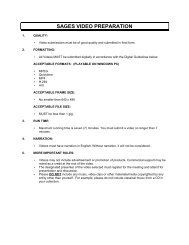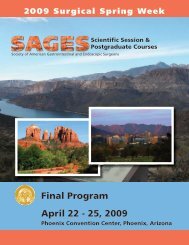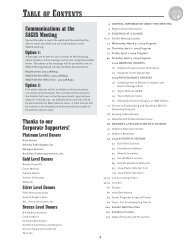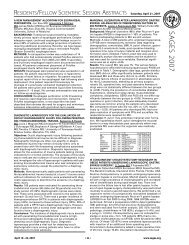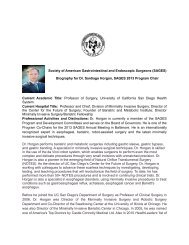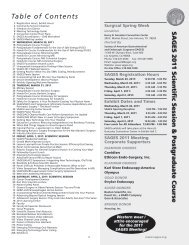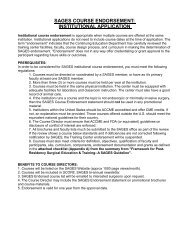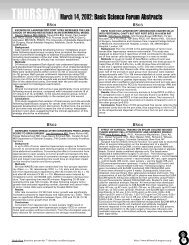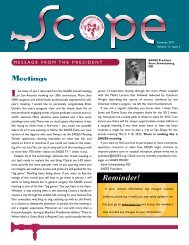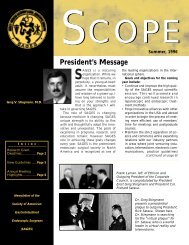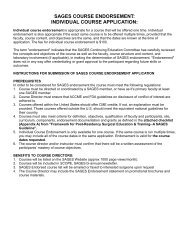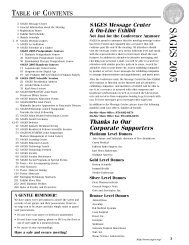2005 SAGES Abstracts
2005 SAGES Abstracts
2005 SAGES Abstracts
Create successful ePaper yourself
Turn your PDF publications into a flip-book with our unique Google optimized e-Paper software.
POSTER ABSTRACTS<br />
allows identification and treatment of occult endoscopic<br />
pathology prior to gastric bypass.<br />
P032–Bariatric Surgery<br />
ACUTE RENAL FAILURE ASSOCIATED WITH LAPAROSCOPIC<br />
GASTRIC BYPASS SURGERY, Melissa M Schnell MD, Reena<br />
Bhargava MD, Calvin A Selwyn MD,Keith S Gersin MD,<br />
University of Cincinnati<br />
Hospital acquired acute renal failure (ARF) increases the risk of<br />
morbidity and mortality. Roux-en-Y laparoscopic gastric<br />
bypass is a common surgical treatment for morbid obesity.<br />
Comorbid conditions such as heart disease, hypertension, and<br />
diabetes increases the risk of post-operative ARF in these<br />
patients. Treatment of comorbidities with agents that impair<br />
renal autoregulatory responses can potentially exacerbate<br />
peri-operative ARF.<br />
We present a case series of five laparoscopic gastric bypass<br />
surgery patients who experienced post-operative ARF between<br />
November 2003 and May 2004. Our hospital performs approximately<br />
500 laparoscopic gastric bypasses per year. There was<br />
one male and four female patients with body mass index<br />
between 45-73. The baseline serum creatinine ranged from<br />
0.6mg/dl to 1.2mg/dl. None of these patients received other<br />
nephrotoxic agents. Anaesthetic records did not show any evidence<br />
of intra-operative hypotension. The magnitude of<br />
increase in serum creatinine by post-operative day two ranged<br />
from 60% to 350% above baseline. Of the five patients, four<br />
were on either an angiotensin converting enzyme (ACE)<br />
inhibitor or angiotensin receptor blocker (ARB) and a diuretic<br />
preoperatively. Three patients were also taking a COX-II<br />
inhibitor. These patients were instructed to take a clear liquid<br />
diet 24 hours prior to surgery and the standard overnight fast<br />
and continued scheduled medications. All five patients<br />
resolved their ARF and no other patients undergoing laparoscopic<br />
Roux-en-Y gastric bypass had ARF.<br />
Peri-operative volume depletion, insensible fluid loss, and the<br />
hemodynamic effects of laparoscopic surgery may create a<br />
setting for the development of ischemic renal injury. This risk<br />
can be exacerbated by use of ACE inhibitors or an ARB in<br />
combination with prostaglandin inhibitors and diuretics by<br />
impairing renal autoregulation and blunting the sympathetic<br />
nervous system response to volume depletion. In patients<br />
undergoing elective bypass surgery, it may be prudent to discontinue<br />
such medications 48-72 hours prior to surgery to<br />
minimize the risk of post-operative ARF. Further studies are<br />
necessary to evaluate the appropriate period for discontinuation<br />
of these medications prior to laparoscopic Roux-en-Y gastric<br />
bypass.<br />
P033–Bariatric Surgery<br />
THE UTILITY OF ESOPHAGOGASTRODUODENOSCOPY PRIOR<br />
TO LAPAROSCOPIC ROUX EN Y GASTRIC BYPASS SURGERY,<br />
D Camacho MD, D J Reichenbach MD,C Badgwell BA,W Fisher<br />
MD,J F Sweeney MD, Michael E. DeBakey Department of<br />
Surgery, Baylor College of Medicine<br />
PURPOSE: The need for routine esophagogastroduodenoscopy<br />
(EGD) prior to laparoscopic gastric bypass surgery<br />
(LGBS) remains controversial. The current study was undertaken<br />
to determine the prevalence of upper gastrointestinal disease<br />
(UGD) in morbidly obese patients prior to LGBS. METH-<br />
ODS: 51 patients (43 female, 8 male) with a mean age of 44<br />
years and a mean BMI of 46.7 kg/m2 underwent LGBS for morbid<br />
obesity. All patients underwent pre-operative EGD. A retrospective<br />
chart review was conducted to document the presence<br />
of UGD symptoms or known UGD prior to surgery. Preoperative<br />
EGD interpretations and biopsy results were<br />
reviewed to document the presence of UGD prior to LGBS.<br />
Pre-operative findings where compared to pathology reports<br />
from gastric tissue collected at the time of surgery. RESULTS:<br />
Thirty-three of 51 (64.7%) patients reported symptoms of UGD<br />
prior to surgery. Of the 33 symptomatic patients, 28 (84.8%)<br />
had positive findings on EGD and were placed on acid suppressive<br />
medications. Eighteen of 51 (36%) patients reported<br />
no symptoms of UGD prior to surgery, of which 11 (61.1%)<br />
had UGD on EGD. Out of all 51 patients screened, 39 (76.4%)<br />
showed positive endoscopic findings at the time of pre-operative<br />
EGD. Of the 39 patients with evidence of UGD, chronic<br />
gastritis was present in 10 (25.6%) patients, active gastritis was<br />
present in 13 (33.3%) patients, and esophagitis was present in<br />
17 (43.5%) patients. One patient (2.6%) had chronic gastritis<br />
and esophagitis. Three patients (7.6%) had both active gastritis<br />
and esophagitis. Pre-operative biopsy revealed H. pylori in 5<br />
(12.8%) patients, one of whom also had non-dysplastic<br />
Barrett?s. All patients with H. pylori were treated prior to<br />
LGBS. Seven (13.7%) of the operative biopsies showed evidence<br />
of chronic gastritis; none demonstrated active gastritis<br />
or H. pylori. CONCLUSIONS: In light of the significant amount<br />
of gastrointestinal pathology observed prior to surgery in<br />
symptomatic and asymptomatic patients, upper endoscopy<br />
with biopsy should be considered integral in the pre-operative<br />
evaluation of candidates for gastric bypass surgery.<br />
P034–Bariatric Surgery<br />
LAPAROSCOPIC REVISIONS OF ROUX-EN-Y GASTRIC<br />
BYPASS, Federico Ceppa MD, Daniel Gagné MD,Pavlos<br />
Papasavas MD,Philip Caushaj MD, The Western Pennsylvania<br />
Hospital, Temple University Medical School Clinical Campus<br />
Introduction: We investigated whether laparoscopic revisional<br />
surgery following failed Roux-en-Y gastric bypass (RYGBP) is<br />
safe and effective in achieving further weight loss.<br />
Methods: Retrospective chart review of all patients undergoing<br />
revisional surgery following failed RYGBP. Failed RYGBP was<br />
determined by



